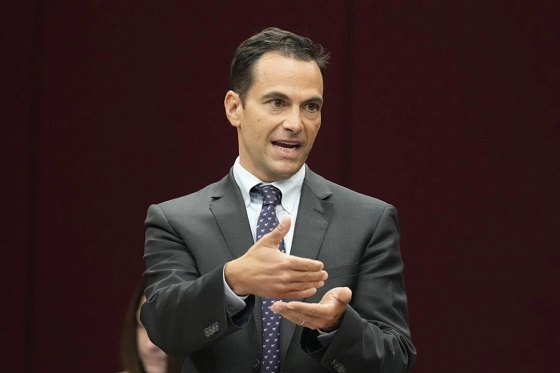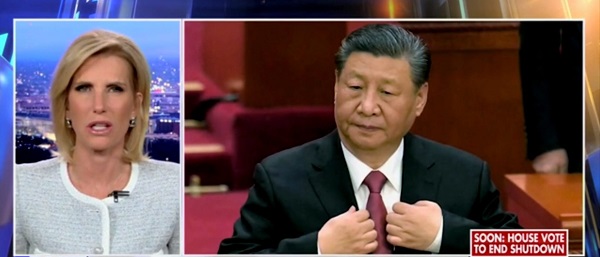Business
‘Accountability Is Coming’: Joni Ernst Sends Musk’s DOGE ‘A Trillion Dollars’ Worth Of Ideas To Gut Gov’t Spending

 From the Daily Caller News Foundation
From the Daily Caller News Foundation
Republican Sen. Joni Ernst of Iowa sent Department of Government Efficiency (DOGE) co-chairs Tesla CEO Elon Musk and former Republican presidential candidate Vivek Ramaswamy a letter Monday with ideas for cuts that could save the federal government over $2 trillion.
Trump named Musk and Ramaswamy as co-chairs of DOGE on Nov. 12. In the seven-page letter, Ernst’s suggestions ranged from addressing unused space in buildings to uncommitted spending for COVID relief, with the proposed cuts totaling over $2 trillion.
Ernst has focused on government waste since her election to the United States Senate in 2014, with a recent focus on the effects of telework and remote work on federal agencies.
“When faced with proposals to trim the fat from Washington’s budget, members of Congress from both parties act like Goldilocks,” Ernst wrote. “It’s too little or too big, always too hard, and never just right. But the real ‘make-believe’ of this fairy tale is that it’s impossible to reduce Washington’s budget without causing pain. Most Americans aren’t even benefitting in any meaningful way from hundreds of billions of dollars being wasted.”
“While you’re seeking ‘super high-IQ small-government revolutionaries’ for ‘unglamorous cost-cutting,’ all that’s really needed is a little common sense. If you can’t find waste in Washington, there can only be one reason: you didn’t look,” Ernst continued.
Three rail projects in California with a combined price tag of over $135 billion, $213 million in unemployment payments to millionaires, $31 million in pay to government employees with no assigned duties and $10 billion in inaccurate Supplemental Nutritional Assistance Program payments are among the programs Ernst listed as potential cuts. Ernst also said there was over $1.6 trillion in uncommitted COVID relief spending.
Ernst announced Friday she would lead a Senate DOGE caucus to work alongside Musk and Ramaswamy, while Republican Rep. Marjorie Taylor Greene was named as chair of a House Oversight Committee subpanel called the Delivering on Government Efficiency panel.
“I have a simple message to the bureaucrats who haven’t shown up for work in years and the government contractors and grantees collecting millions to study how fast a shrimp runs on a treadmill – buckle up because accountability is coming,” Ernst said in a statement provided to the Daily Caller News Foundation. “My decade-long mission to make Washington squeal has created an exhaustive list of more than $2 trillion worth of waste, fraud, and abuse that I will work with DOGE to cut. We are going to break down the nonsense that has taken over Washington and put in its place a government that actually works for the people.”
Ernst previously questioned USAID over an employee who improperly received “locality pay” for the Washington, D.C. area despite living in Florida, and requested a staff briefing after a second instance of improper locality pay involving another USAID employee living in North Carolina was reported.
In an August 2023 letter requesting a review of the issues involved with telecommuting sent to 24 government agencies, Ernst cited a media account of a VA employee who attended a staff meeting while taking a bubble bath.
Ernst wrote the Environmental Protection Agency (EPA), urging the agency to take emergency action in an August 28 letter sent to EPA Administrator Michael Regan about contaminants that built up in the drinking water of federal buildings left unoccupied by a shift to remote work.
Ernst introduced the Stopping Home Office Work’s Unproductive Problems (SHOW UP) Act, in September 2023 as part of a package of legislation to rein in the “administrative state.”
“This is by no means an exhaustive list, and I will be providing many more recommendations soon,” Ernst wrote. “My team and I are ready to help you make some prime cuts.”
The Trump-Vance transition team did not immediately respond to a request for comment from the DCNF.
Business
Parliamentary Budget Officer begs Carney to cut back on spending

PBO slices through Carney’s creative accounting
The Canadian Taxpayers Federation is calling on Prime Minister Mark Carney to cut spending following today’s bombshell Parliamentary Budget Officer report that criticizes the government’s definition of capital spending and promise to balance the operating budget.
“The reality is that Carney is continuing on a course of unaffordable borrowing and the PBO report shows government messaging about ‘balancing the operating budget’ is not credible,” said Franco Terrazzano, CTF Federal Director. “Carney is using creative accounting to hide the spiralling debt.”
Carney’s Budget 2025 splits the budget into operating and capital spending and promises to balance the operating budget by 2028-29.
However, today’s PBO budget report states that Carney’s definition of capital spending is “overly expansive.” Without using that “overly expansive” definition of capital spending, the government would run an $18 billion operating deficit in 2028-29, according to the PBO.
“Based on our definition, capital investments would total $217.3 billion over 2024-25 to 2029-30, which is approximately 30 per cent ($94 billion) lower compared to Budget 2025,” according to the PBO. “Moreover, based on our definition, the operating balance in Budget 2025 would remain in a deficit position over 2024-25 to 2029-30.”
The PBO states that the Carney government is using “a definition of capital investment that expands beyond the current treatment in the Public Accounts and international practice.” The report specifically points out that “by including corporate income tax expenditures, investment tax credits and operating (production) subsidies, the framework blends policy measures with capital formation.”
The federal government plans to borrow about $80 billion this year, according to Budget 2025. Carney has no plan stop borrowing money and balance the budget. Debt interest charges will cost taxpayers $55.6 billion this year, which is more than the federal government will send to the provinces in health transfers ($54.7 billion) or collect through the GST ($54.4 billion).
“Carney isn’t balancing anything when he borrows tens of billions of dollars every year,” Terrazzano said. “Instead of applying creative accounting to the budget numbers, Carney needs to cut spending and debt.”
Business
Carney government needs stronger ‘fiscal anchors’ and greater accountability

From the Fraser Institute
By Tegan Hill and Grady Munro
Following the recent release of the Carney government’s first budget, Fitch Ratings (one of the big three global credit rating agencies) issued a warning that the “persistent fiscal expansion” outlined in the budget—characterized by high levels of spending, borrowing and debt accumulation—will erode the health of Canada’s finances and could lead to a downgrade in Canada’s credit rating.
Here’s why this matters. Canada’s credit rating impacts the federal government’s cost of borrowing money. If the government’s rating gets downgraded—meaning Canadian federal debt is viewed as an increasingly risky investment due to fiscal mismanagement—it will likely become more expensive for the government to borrow money, which ultimately costs taxpayers.
The cost of borrowing (i.e. the interest paid on government debt) is a significant part of the overall budget. This year, the federal government will spend a projected $55.6 billion on debt interest, which is more than one in every 10 dollars of federal revenue, and more than the government will spend on health-care transfers to the provinces. By 2029/30, interest costs will rise to a projected $76.1 billion or more than one in every eight dollars of revenue. That’s taxpayer money unavailable for programs and services.
Again, if Canada’s credit rating gets downgraded, these costs will grow even larger.
To maintain a good credit rating, the government must prevent the deterioration of its finances. To do this, governments establish and follow “fiscal anchors,” which are fiscal guardrails meant to guide decisions regarding spending, taxes and borrowing.
Effective fiscal anchors ensure governments manage their finances so the debt burden remains sustainable for future generations. Anchors should be easily understood and broadly applied so that government cannot get creative with its accounting to only technically abide by the rule, but still give the government the flexibility to respond to changing circumstances. For example, a commonly-used rule by many countries (including Canada in the past) is a ceiling/target for debt as a share of the economy.
The Carney government’s budget establishes two new fiscal anchors: balancing the federal operating budget (which includes spending on day-to-day operations such as government employee compensation) by 2028/29, and maintaining a declining deficit-to-GDP ratio over the years to come, which means gradually reducing the size of the deficit relative to the economy. Unfortunately, these anchors will fail to keep federal finances from deteriorating.
For instance, the government’s plan to balance the “operating budget” is an example of creative accounting that won’t stop the government from borrowing money each year. Simply put, the government plans to split spending into two categories: “operating spending” and “capital investment” —which includes any spending or tax expenditures (e.g. credits and deductions) that relates to the production of an asset (e.g. machinery and equipment)—and will only balance operating spending against revenues. As a result, when the government balances its operating budget in 2028/29, it will still incur a projected deficit of $57.9 billion when spending on capital is included.
Similarly, the government’s plan to reduce the size of the annual deficit relative to the economy each year does little to prevent debt accumulation. This year’s deficit is expected to equal 2.5 per cent of the overall economy—which, since 2000, is the largest deficit (as a share of the economy) outside of those run during the 2008/09 financial crisis and the pandemic. By measuring its progress off of this inflated baseline, the government will technically abide by its anchor even as it runs relatively large deficits each and every year.
Moreover, according to the budget, total federal debt will grow faster than the economy, rising from a projected 73.9 per cent of GDP in 2025/26 to 79.0 per cent by 2029/30, reaching a staggering $2.9 trillion that year. Simply put, even the government’s own fiscal plan shows that its fiscal anchors are unable to prevent an unsustainable rise in government debt. And that’s assuming the government can even stick to these anchors—which, according to a new report by the Parliamentary Budget Officer, is highly unlikely.
Unfortunately, a federal government that can’t stick to its own fiscal anchors is nothing new. The Trudeau government made a habit of abandoning its fiscal anchors whenever the going got tough. Indeed, Fitch Ratings highlighted this poor track record as yet another reason to expect federal finances to continue deteriorating, and why a credit downgrade may be on the horizon. Again, should that happen, Canadian taxpayers will pay the price.
Much is riding on the Carney government’s ability to restore Canada’s credibility as a responsible fiscal manager. To do this, it must implement stronger fiscal rules than those presented in the budget, and remain accountable to those rules even when it’s challenging.
-

 Frontier Centre for Public Policy1 day ago
Frontier Centre for Public Policy1 day agoRichmond Mayor Warns Property Owners That The Cowichan Case Puts Their Titles At Risk
-

 Alberta2 days ago
Alberta2 days agoHow economic corridors could shape a stronger Canadian future
-

 Daily Caller2 days ago
Daily Caller2 days agoLaura Ingraham’s Viral Clash With Trump Prompts Her To Tell Real Reasons China Sends Students To US
-

 Business1 day ago
Business1 day agoP.E.I. Moves to Open IRAC Files, Forcing Land Regulator to Publish Reports After The Bureau’s Investigation
-

 Business1 day ago
Business1 day agoMark Carney Seeks to Replace Fiscal Watchdog with Loyal Lapdog
-

 COVID-191 day ago
COVID-191 day agoMajor new studies link COVID shots to kidney disease, respiratory problems
-

 International22 hours ago
International22 hours agoIs America drifting toward civil war? Joe Rogan thinks so
-

 Censorship Industrial Complex21 hours ago
Censorship Industrial Complex21 hours agoEU’s “Democracy Shield” Centralizes Control Over Online Speech





